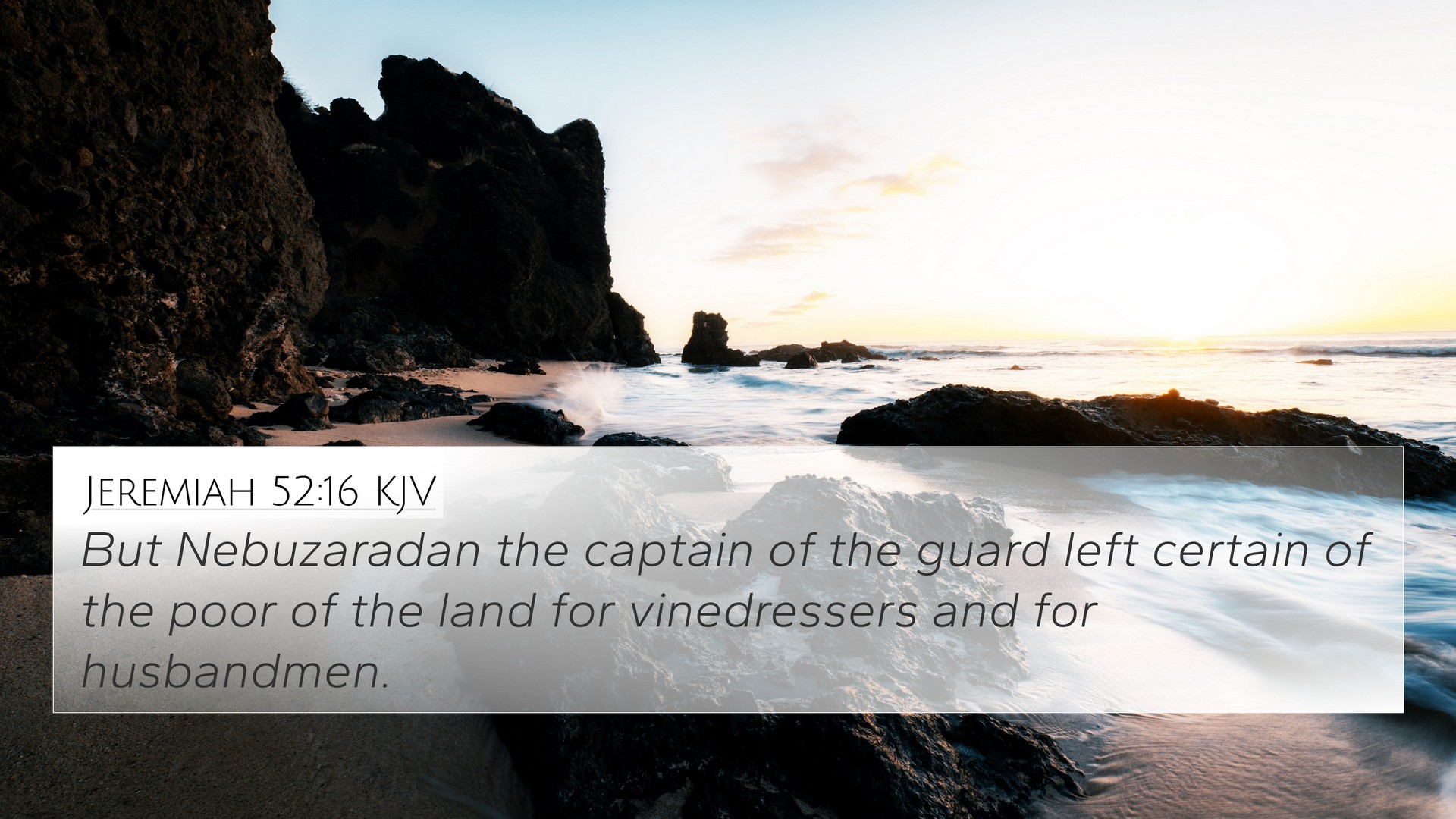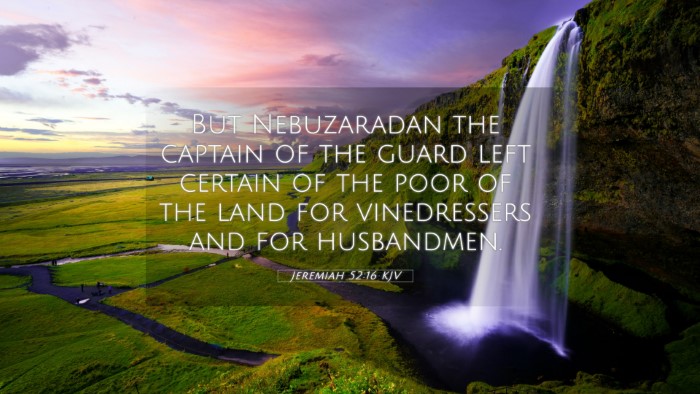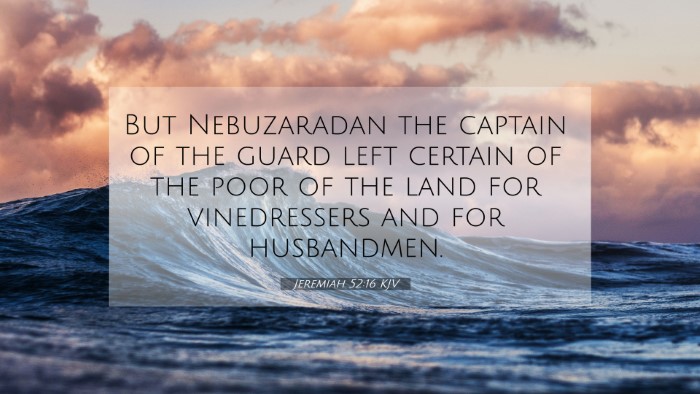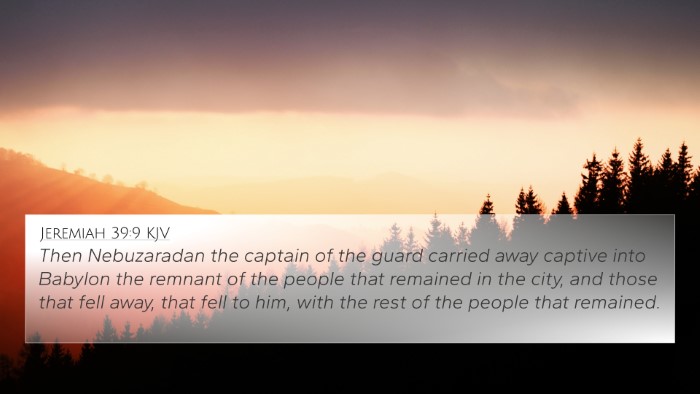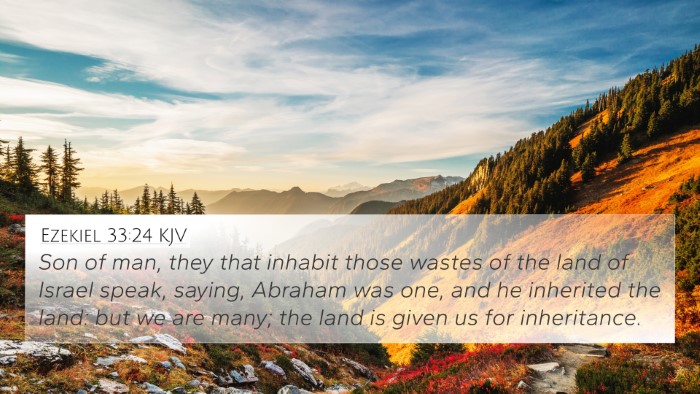Understanding Jeremiah 52:16
The verse Jeremiah 52:16 reads:
"But Nebuzaradan the captain of the guard left of the poor of the people, which had nothing, in the land of Judah, and gave them vineyards and fields at the same time."
This brief yet poignant passage relates to the broader themes of judgment, mercy, and hope found throughout the book of Jeremiah and the prophetic literature of the Old Testament.
Summary of the Verse's Meaning
In this context, Jeremiah 52:16 reveals the aftermath of Jerusalem's fall and the Babylonian exile. Nebuzaradan, representing the power of Babylon, shows a nuanced attitude when he decides to spare some of the poor, allowing them a semblance of normalcy and sustenance amidst destruction.
Insights from Public Domain Commentaries
-
Matthew Henry:
Henry emphasizes the mercy shown by Nebuzaradan. Even as a conqueror, he does not wholly devastate the land; instead, he recognizes the value in leaving the poor inhabitants with their livelihoods. This act highlights a theme of divine mercy, suggesting hope and a future for the remnant of Israel.
-
Albert Barnes:
Barnes discusses the implications of this verse, interpreting it as an illustration of God's providence. Even in Babylonian oppression, the remnant is given a chance to prosper slightly in their own land, which could be seen as a foreshadowing of restoration.
-
Adam Clarke:
Clarke notes that this act of sparing the poor indicates a principle of justice. The Babylonian leader acts not out of a desire for justice but perhaps pragmatically, opting to cultivate a segment of the population that can contribute to the land's economic viability.
Cross-References Related to Jeremiah 52:16
- 2 Kings 25:12 - This parallel passage describes the same event, emphasizing the preservation of some poor people for their potential contribution to the land.
- Jeremiah 39:10 - A similar theme where the captains spare the poor and needy, reflecting God's mercy amid judgment.
- Isaiah 14:2 - Here, we see a prophecy emphasizing the reversal of fortunes, including the theme of Israel’s restoration.
- Ezekiel 33:30-31 - This speaks to the attitudes of the poor who are often neglected but ultimately heard by God.
- Leviticus 25:39-40 - Reflects the ancient practice of allowing the poor to retain a part of the land, emphasizing God’s concern for the marginalized.
- Micah 4:4 - An image of peace and security in which the poor find abundance, showcasing God’s intention for restoration.
- Revelation 21:4 - A promise of future comfort and restoration aligns with the hopes embedded in Jeremiah 52:16.
Thematic Connections
Jeremiah 52:16 illustrates significant themes in scripture:
-
Mercy in Judgment:
The act of sparing the poor serves as a reminder that God's mercy prevails even amidst severe judgment, as seen throughout the prophetic writings.
-
Restoration:
This verse sets the stage for future restoration promises detailed in other prophetic texts, reinforcing the idea that exile does not signify permanent abandonment.
-
Divine Providence:
The favor shown by the Babylonian captain indicates a divine plan at work, aligning with other instances where God’s hand is evident in circumstances of suffering.
Tools for Cross-Referencing Biblical Texts
For those studying such interconnected themes, various tools can enhance understanding:
- Bible Concordance: A reference tool for locating scripture related to specific keywords within the Bible.
- Bible Cross-Reference Guide: Simplifies finding related verses across different books.
- Cross-Reference Bible Study Methods: Strategies for comparing similar themes across the scriptures to generate deeper understanding.
Application and Reflection
As we reflect on Jeremiah 52:16, several questions arise:
- What does it mean for us today to understand God’s mercy in our circumstances?
- How can we be instruments of hope like Nebuzaradan in communities facing oppression?
- What parallels can we draw between the Biblical remnant and our roles in modern society?
In conclusion, Jeremiah 52:16 serves as a profound reminder of God’s continued faithfulness and mercy amidst judgments. Through careful cross-referencing, we gain a clearer picture of the woven fabric that is scripture, encouraging us to seek deeper understanding and application in our lives.
